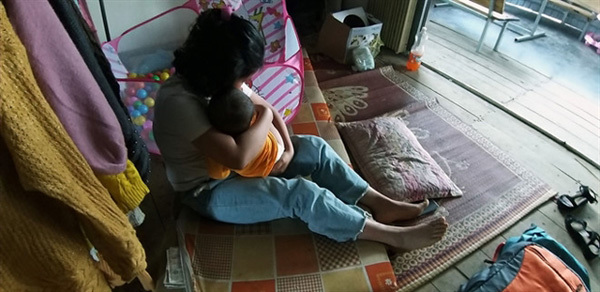 |
Human traffickers have been approaching poor pregnant women and offering to buy their unborn babies.
“Pregnant women selling their babies is nothing new, but now the situation has become more serious,” said Luong Hong Loan, deputy director of the Pacific Links Foundation Programme, a US NGO.
People used to go to maternity hospitals to buy babies in the guise of adoption, Loan told Thanh Niên (Young People) newspaper.
Now they would visit villages and approach poor pregnant women, she said.
If the women agreed to hand over their babies, they would be paid in advance as a prenatal expense, said Loan.
The money was used to pay debts or cover expenses.
Luong Thi C from Quang Ninh Province was taken to China to give birth when she was eight months pregnant.
After giving birth, she was allowed to stay with her baby for just one day.
She returned home with VND60 million (US$2,600), the most money she had ever held in her life.
Mong Thi Thao from the Kho Mu ethnic minority group in Nghe An Province was persuaded to sell her baby with the promise of money to cover family expenses and a brighter future for her baby.
She went to China to give birth and sold her baby for VND50 million (US$2,100).
Illegal surrogacy
Along with the baby trade, human traffickers are also running illegal surrogacy operations.
Last year, police in the central province of Nghe An discovered 25 cases of ethnic minority women from Ky Son District going to China to give birth, five of whom admitted to selling their babies.
Eight women from Quang Ninh Province were also found to have acted as illegal surrogates for Chinese people.
Last year, Quang Ninh police arrested eight Vietnamese women for running an illegal surrogacy business that involved taking Vietnamese women to China. An official from the Department of Labour, Invalids and Social Affairs in Lao Cai Province told the paper there were cases of women leaving for China to become wives or surrogate mothers.
In another previous case, 42 women from one commune were invited to go to China to marry foreign men or become surrogate mothers.
The women were sent photos of a handsome man standing in front of a 3-storey house with a luxury car.
The women were offered VND200-300 million (US$9,000 -13,000) for each baby.
Fortunately, provincial border soldiers put an end to the scam.
Kidnapping
The human traffickers also approached disadvantaged people in mountainous areas.
Hoang T. D (not her real name) in the northern mountainous province of Dien Bien is another typical case.
Her parents were drug addicts, and she was forced to leave school early to work.
She was cruelly beaten by her parents if she did not earn money for them to buy drugs.
Her brother was sold to a couple in the village as an adopted child.
Three years ago, the 15-year-old girl received an “add friend” request on Facebook.
The man sent her an avatar photo of him wearing a Chinese police uniform.
“He asked me to go to China and promised to marry me and offer me a better life,” D recalled.
“I trusted him and followed him to China, but he sold me,” she said.
Fortunately, D was rescued and sent to a charity home in Lao Cai Province.
The case of San May and Ta May from the Dao ethnic group has a familiar theme.
San May and Ta May dropped out of school in the eighth grade to work on the farm.
While they were at a fair, a man tricked them into going to China, but luckily they were rescued by Chinese police.
But one month later, the girls were drugged and sent to China anyway.
After several attempts to escape, San May and Ta May were once again rescued by police.
At present, the two friends are living in a charity home in Lao Cai where San May paints about her ordeal in China.
Nguyen Tuong Long, head of the charity home, said ethnic minority people were vulnerable and easily tricked by human traffickers.
More information about the dangers of human trafficking was needed for both local authorities and the public, he said.
“Many women innocently think they can't be tricked because they are married and mature," said Long.
In fact, in remote, mountainous and border areas, many married women have become victims of human traffickers.
Some women chose to leave their cruel husbands to illegally work or marry in China, Long said. – VNS

Vietnamese women arrested for surrogacy
Police in the northern province of Quang Ninh’s Ha Long City have stopped an organised surrogacy set-up.

Public security minister first to field questions by NA deputies
Minister of Public Security To Lam is the first to field queries at the National Assembly’s question-and-answer (Q&A) session that begins in Hanoi on June 4.
 The trade of unborn babies to China and illegal surrogacy have become a serious problem in northern mountainous provinces.
The trade of unborn babies to China and illegal surrogacy have become a serious problem in northern mountainous provinces.